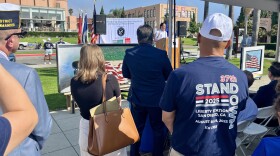Part II: ‘We Were Expendable’
The Montford Point Marines are a little known part of U.S. military history. Born out of necessity, when African American men were first drafted to serve in World War II, the legacy of the Marines who trained at Montford Point in North Carolina is a mirror of the times, back when segregation and discrimination were par for the course.
These Marines served with valor, determined to succeed despite the obstacles brought on by the racism that they had to face each day. Of the 20,000 original Montford Point Marines, not many remain, but here in San Diego there are three, who we are honoring as Black History Month Local Heroes: Retired Gunnery Sergeant, Dr. Carrel Reavis, whose service to our country has been recognized with an honorary doctorate from Virginia University at Lynchburg; Retired First Sergeant Joe Earl Jackson; and Retired Gunnery Sergeant J.T. Inge.
In Part I of their story, they shared their memories of Montford Point, a once segregated training facility located on Camp Lejuene. The camp as it was then no longer exists, and has since been renamed. But its significance to our history continues to live on. Here, in Part II, the men continue their stories and reveal what being a Montford Point Marine has meant to them.
Deployment:
After completion of boot camp, Reavis was assigned to an ammunitions company in Hawaii. Jackson headed to the Infantry training regiment at Camp Geiger. And Inge, who entered the Marine Corps the year after World War II ended, was appointed to Interior Guard Duty on Saipan, before being reassigned to Guam.
Though their boot camp experience was sometimes far more arduous than anything their white counterparts had to go through, the Montford Point Marines were limited to non-combat support roles. They were considered replacements, and their sole purpose was to provide support to the white men who were doing the fighting in World War II. This proved frustrating for the African Americans Marines, whose training had prepared them to fight.
“German and Japanese prisoners had more rights than we had," acknowledges Reavis. “These are the things people don’t talk about. I lived through it. When I went overseas we didn’t have infantry organizations like the white folks had. We handled ammunition supplies and boxes, whatever the guys fighting needed. That’s all we could do. During combat, we’d take ammunition out to the white Marines and bring the dead back. We were fighting two fronts—fighting to be free and fighting to fight.”
"Even though there were no black fighting units, we fought in self-defense,” exclaims Jackson, “We went through all the training but we weren’t allowed to fight unless it was self-defense, and you had to fight in self-defense both ways when retrieving ammo."
“When the war was over they didn't need you anymore,” remembers Reavis. “So we were just processed and discharged, but I returned to Montford Point and reenlisted.”
“I served in Saipan,” says Jackson. “When the war ended I didn’t go back to Birmingham. I was in Communications, so I was among the first to hear when the word came down that we were finally accepted as Marines, and no longer considered Reserves. So I stayed. We were just as capable as any other Marines.”
“Replacements weren't considered real Marines,” explains Inge. “We were not always a replacement for white units, but replacements for black units. When we got to Saipan, we guarded the Japanese POWs that were still there….After a while, we were no longer needed so they sent us to Guam, where there was ammunition left from the war. They were taking the ammunition out to the ocean and dumping it, and there was a big explosion there, just before I arrived. Whatever dangerous jobs were needed they used the people who they thought were expendable. We were expendable.”
“From 1946 to ‘47 is what we call the bad years,” says Reavis. “An order was issued (see Letter of Instruction 421) to all in the Marine Corps that at no time could there ever be a Negro over a white person. You could not have a black sergeant over a white corporal, so we couldn't be promoted. It was bad because we didn’t want to stay at Montford Point, we wanted to go to the barracks where everybody else was. We had fought in the war and we thought we had earned it.”
“It got so bad that in 1948 President Harry S. Truman issued an executive order and integrated all the military,” continues Reavis.
“When the Marine Corps was desegregated, we went over to the main camp,” recalls Inge. “They had this big barrack with two big wings. We were in the same barrack, but the blacks were in one wing and the whites were in the other. We were in the same building but we were still segregated."
"During the Korean War era is when things started to change for the Negro Marine,” notes Reavis. “We really got into the battle. We were integrated; we were on the front lines. We’ve been in the war ever since then. We had recognition and promotions. You could make sergeant or major, and we had officers, a general and a career pilot."
Despite the strides made during the Korean War, discrimination on and off the base persisted.
“It was very hard, very difficult, all the way from 1948 to the 1960s and 70s,” explains Reavis. “Even though the military services were integrated, we still had not been fully accepted."
“It was the same everywhere," observes Inge. "When I was transferred to Twentynine Palms (in California), I went to a motel to get a room until I could get quarters on the base. They told me, ‘We have no vacancies,’ but they have a light on that says 'vacancy.' When I point out the vacancy light being on, they say, 'Oh, we forgot to turn it off.' And then a white person comes in and gets a room. They couldn’t say, ‘I cannot rent to you because you’re black,’ because they would’ve ended up with a lawsuit, but they had a way of getting around it, and it was known as ‘defacto segregation.’”
Jackson laughs sardonically at this. When asked why, he shrugs, declaring, “Because it’s true.”

Jackson, like the other Montford Point Marines, hopes that by sharing their story they'll finally attain their rightful place in history.
“For decades, Montford Point got no recognition because it was an all-black training facility,” says Inge. “Not until 2011, when Commandant James F. Amos heard about it, he said it should become part of history.”
“But how many years did it take,” wonders Reavis. “Until three years ago nobody knew about us. We were awarded the Congressional Gold Medal in 2012, the highest civilian award you can receive in the United States, yet many still don’t know about Montford Point. There are no movies, nothing that shows Negro Marines in World War II. To preserve our legacy, the Montford Point Marines Association began in 1964. It came about because we could not join the VFW (Veterans of Foreign Wars) and the American Legion. And from that we grew to where we are today. We passed in our bylaws that any military person who has served honorably in the United States can join our organization.
Montford Point Camp officially closed in 1949, a year after desegregation became law. Then, in 1974, the camp was renamed Camp Johnson, after Sergeant Major Gilbert H. “Hashmark” Johnson, one of the first African Americans to join the Corps, and who became a distinguished Montford Point Drill Instructor and veteran of World War II and the Korean War.
"The camp is different now but I can’t say for sure because I haven’t been back," Jackson admits.
When asked whether he’s curious to go back, his response is quick and to the point.
“Nope."
Despite the troubling memories of his time at Montford Point, Jackson is appreciative of the lessons he learned while there.
“Being part of the Montford Point Marines changed my life to the point that I’m still here,” he acknowledges. “I would do it over again. It gave me the backbone not to accept what was handed down.”
“Boot camp helped you deal with discrimination,” explains Inge. “It helped build coping mechanisms to deal with discrimination in the outside world. Without it, we could’ve fought back, sought revenge, gone postal. We could’ve ended up in jail.”
“Or, dead,” Jackson adds bluntly, giving a little chuckle under his breath. “Some instances you have to smile or laugh through the situations, because it’s really sad to me, and I laugh to keep from crying.”






